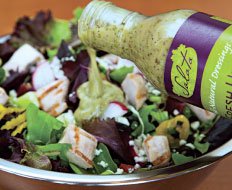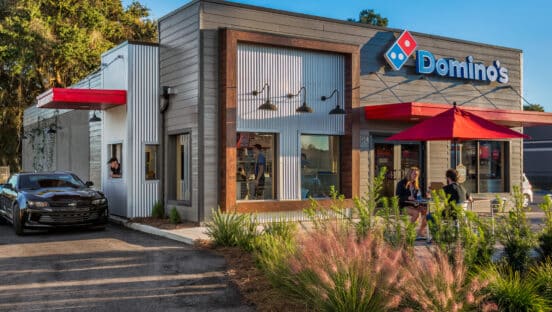In 2003, Berge Simonian noticed something interesting happening in the restaurant he had operated for almost a decade in downtown Houston. The line for salads was frequently longer than the line for hot foods.
With that in mind, Simonian and his business partner, Tony Kyoumjian, began working on the idea of a quick-serve salad concept. Believing that a salad is only as good as the dressing you put on it, the partners focused intently on recipes for salad dressings, sauces, and soups, and the first Salata location opened its doors in late 2005. “Our goal is to be a good, clean, healthy-choice restaurant,” Simonian says. “Ingredient freshness, quality, variety, and taste are key.”
Dining at a Salata is simple. Guests start by choosing a fresh salad, priced at $8, or a salad wrap for $7. They walk down the line picking and choosing from a variety of salad ingredients, and the salad is constructed, tossed, and handed to the customer at the end of the line. All prices on the Salata menu include tax, so there are no surprises when the customer goes to pay.
“You just point to what you want,” Simonian says. “We offer an array of more than 50 greens, vegetables, fruits, cheeses, nuts, seeds, and dry fruits.”
Salata
Founder : Berge Simonian
HQ: Houston
Year Started: 2005
Annual Sales: Undisclosed
Total Units:19
Franchise units: 11
Grilled chicken adds $2 to a salad and $1 to a wrap. It is available in an assortment of flavors: herb-marinated, pesto, spicy chipotle, and Asian BBQ. Seafood options—spicy shrimp, baked salmon, imitation crabmeat, or a seafood mix—add $3 to a salad and $2 to a wrap.
There are 10 signature dressings to choose from, including herb vinaigrette, ginger lime, chipotle ranch, balsamic vinaigrette, fat-free sun-dried tomato, and fat-free mango.
“For some restaurants, salad dressing is an afterthought,” Simonian says. “They just call their supplier, look at a list, and order. We could never do that. We have to have our own unique signature dressings that we can be identified with.”
Each dressing comes to Salata restaurants in a gallon-sized container from the company’s commissary. The dressings can also be purchased in 12-ounce bottles in the restaurants, though they aren’t sold in retail outlets. “We can’t sell it in grocery stores because it is all natural with no preservatives,” Simonian says. “It has a limited shelf life.”
Salata also offers three soups: tortilla, broccoli, and tomato basil. Toasted wheat bread or pesto bread is served with the soups and is also offered with salads. Wraps come on 12-inch tortillas and are served with baked pita chips.
The dressings, soups, and sauces at Salata are all gluten-free. Simonian says Salata buys produce locally whenever possible. “We get mushrooms from a farm near Houston,” he says. “They have a great product. Wherever we buy it, the product has to be good.”
In order to keep menu prices down, however, Salata cannot go organic, he says. “Nutrition-wise, organic is not much different,” Simonian says. “And for us to sell a salad for $8, we can’t be organic. We focus on washing all of our vegetables very well and cutting them fresh every day. We make sure everything is handled properly.”
Salata focuses on health when it comes to beverages, too, offering a selection of teas and natural lemonade. “These are the drinks we promote because they are healthier,” Simonian says. “But we have sodas, too, because people want it.”
In less than eight years, Salata has grown to 19 restaurants in the Houston area, as well as in Dallas/Fort Worth and Los Angeles. Simonian says the brand has watched its growth carefully, making sure quality is consistent from location to location. “If we couldn’t be consistent, we didn’t want to open any more stores,” he says.
But the consistency has been maintained, and Salata continues to grow. Simonian says the brand is committed to opening 70 units in the next three years, in its current markets and in Orange County, California, and Austin and San Antonio, Texas. “And we are getting started in the Chicago market, as well,” he says.
With soup and salads traditionally viewed as lunch fare, Salata’s lunch/dinner split is two—or even three—to one in some locations, but Simonian says it had been four to one initially. “We’re improving the dinner traffic,” he says. “More and more people are discovering us at night because we like to promote eating light at night.”
Salata is also growing in the number of male customers who walk through the doors. “Our second year in business, we had 65 percent female customers,” Simonian says. “Now that is down to 60 percent, or in some cases 55 percent. More and more men are coming in. Women are discovering us first, and then they bring their husbands in. At first the men say, ‘A salad won’t fill me up,’ and then they can’t finish it.”





